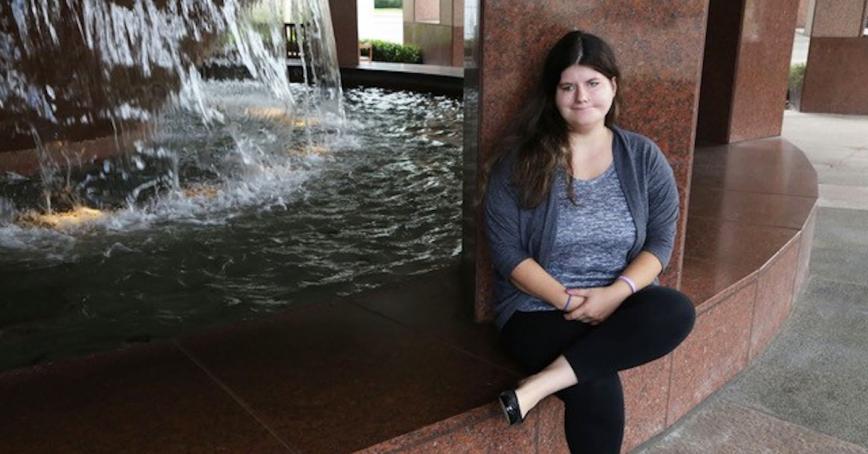She’s used to being looked at. Now, listen.
Topics
Featured
Share online

UPDATE July 2022: Since we published this story, Ferrill has gone on to graduate from the Master of Arts in Intercultural and International Communication program and take a role as a Communications Officer for AboutFace, a nonprofit that supports Canadians living with facial differences.
**
Among its many and far-reaching effects, the COVID-19 pandemic has produced a bounty of missed opportunities: weddings postponed; trips cancelled; and, just last month, large Christmas celebrations foregone in favour of intimate—i.e., safe—household meals.
Kelsey Ferrill’s big missed opportunity was her planned move to Victoria, BC to attend Royal Roads University. A lifelong resident of Calgary, Ferrill was looking for a change when she applied to the university, where she is working toward a Master of Arts in Intercultural and International Communication.
But that move was about more than a change of scenery and working toward a future beyond Alberta’s oil and gas industry. It was about meeting her classmates face-to-face, and not just for the purpose of networking.
Ferrill, 30, has Moebius Syndrome, a congenital neurological condition that affects the nerves in the brain and whose hallmark effect is facial paralysis/facial weakness, although symptoms vary among people who have Moebius.
So while she says of her desire to attend school at Royal Roads’ campus, “I really wanted that connection. I wanted to meet the faculty and be in the classroom with the people in the program,” she acknowledges a major reason is that she has found talking to people in person allows body language to be part of the communication process.
“I feel like it’s really awkward to just pop-up on someone’s screen when they’ve never seen you before,” says Ferrill, who’s on the board of directors of the Moebius Syndrome Foundation.
She is especially sensitive to such considerations, given a lifetime of people making judgments about her based solely on her appearance.
“I think this is something that I focus on more than I should, maybe. I focus on how people are going to see me and what they’re going to ask and what they’re going to think,” says Ferrill, who notes she is most comfortable communicating from behind a keyboard, sending texts or emails, or posting on social media.
But meeting in online video chats with fellow Royal Roads students and staff, “My experience so far has been…no one really seems to care, it doesn’t faze anyone.”
In one class, Ferrill says, she had to create an introductory video, which she didn’t want to do, and the response was gratifying, with classmates reaching out and saying they wanted to work with her. Many have quickly become good friends “and they are so receptive and so supportive.”
“That’s one of the best outcomes so far,” she says.
Olaolu Adeleye, an associate faculty member in Royal Roads’ School of Communication and Culture, gives credit to Ferrill, saying, “She’s very active. She’s very engaged. Not everybody is participating with the same level of attention but, also, intention.”
He also says Ferrill's open to sharing personal insights and expressing opinions in a way that invites discussion and encourages interaction with other points of view. “That helps specifically in a space which has turned virtual but also in a space that discusses a myriad of topics that can create a range of responses,” says Adeleye.
That tendency to be open-minded could serve Ferrill well as she aims to work in the field of disability awareness internationally.
“That’s why I went into communications,” she says, “because I feel like the stories of people with disabilities aren’t told enough.”
Moebius Syndrome Awareness Day is held every year on Jan. 24, “the birth date of Prof. Paul Julius Moebius, the doctor who first diagnosed the condition in 1888.”